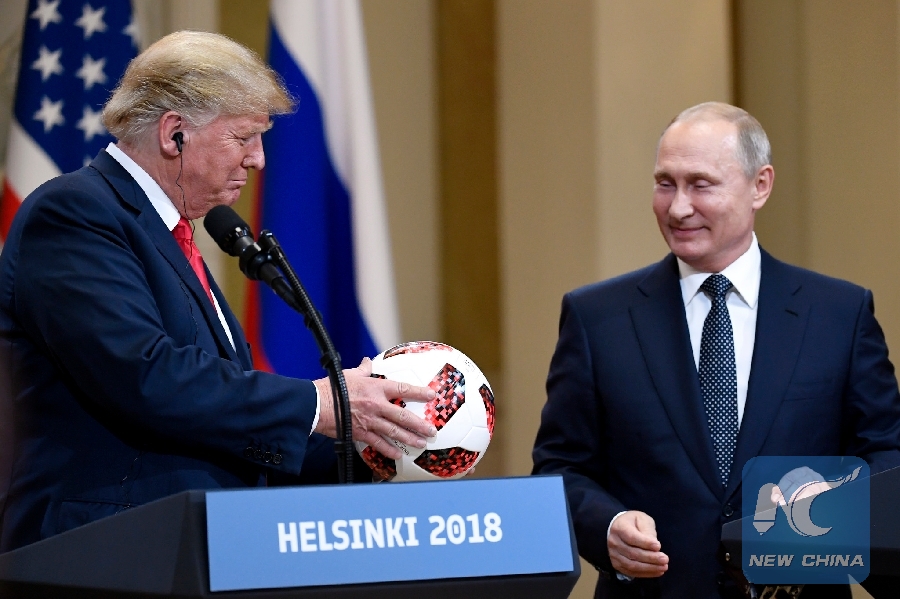
File Photo: U.S. President Donald Trump (L) holds a soccer ball during a joint press conference with Russian President Vladimir Putin in Helsinki, Finland, on July 16, 2018. (Xinhua/Lehtikuva/Antti Aimo-Koivisto)
WASHINGTON, Oct. 19 (Xinhua) -- U.S. National Security Adviser John Bolton on Saturday will start his travel to four nations, including Russia. U.S. experts said that his tour aims to lay the groundwork for the second meeting between U.S. President Donald Trump and Russian President Vladimir Putin, despite little progress in bilateral ties after their first meeting in July.
Bolton tweeted last week to announce his upcoming tour to Russia, Azerbaijan, Armenia, and Georgia, saying he will meet with counterparts and other senior officials in the four countries "to advance American interests on a range of security issues."
Russian presidential aide Yuri Ushakov confirmed Tuesday that Bolton will visit Russia on Oct. 21-23, saying that Bolton is scheduled to meet Russian Security Council Secretary Nikolai Patrushev and Russian Foreign Minister Sergei Lavrov to discuss "the whole complex of relations, which are in a deplorable state."
He said that Bolton might have other meetings, but there is no agreement so far on a meeting with Putin.
Bolton visited Russia in June and met Putin in the Kremlin. One of the most significant results of the visit was an agreement on a Putin-Trump summit in Helsinki on July 16. However, Ushakov said there is no plan so far to organize a new Russia-U.S. summit.
Brookings Institution Senior Fellow Darrell West told Xinhua that "Trump is interested in another meeting with Putin so this trip likely will lay the groundwork for that."
"Bolton will get a sense of what kinds of agreements are possible and how that meeting should be structured," the Brookings fellow explained. "The U.S. is looking for help on North Korea (the Democratic People's Republic of Korea) and Syria, among other places so those will be high on the priority list."
However, he noted that the U.S.-Russia relations have remained "tenuous" due to the Western countries' concern over Russia's behavior in Ukraine and other places.
"Members of Congress are deeply skeptical of Putin and not supportive of any de-escalation" of ties, he said.
Brookings Institution Senior Fellow Michael O'Hanlon also said that "clearly Trump wants to keep relations with Putin and Russia on acceptable ground, but the U.S. responses continue to be firm and tough too, as they should be."
"I favor a broad dialogue, for example on a future security system for eastern Europe, but am not sure they are really giving signs of being inclined in that direction," he added.
William Courtney, an adjunct senior fellow at RAND Corporation, a U.S.-based think tank, told Xinhua that Bolton may again warn Moscow against interference in the 2018 mid-term elections.
"Two bills before Congress -- the Deter and Daska Acts -- could be given impulse if Congress concludes that Russia has carried out significant meddling," he said.
Also, U.S. experts noted that Bolton may raise the dangerous situation around Syria's Idlib Province, and urge Moscow to restrain the Syrian government's plans to use overwhelming force to retake control of the province.
Any evidence that Russian aircraft have attacked civilian targets in Idlib as part of an offensive could cause Congress to approve one or both sanctions bills, Courtney noted.
On Ukraine issue, experts said that Bolton may engage his counterpart about Russia's behavior in eastern Ukraine.
"Moscow has shown no sign of withdrawing, which means Western economic sanctions are likely to remain in force," Courtney noted.
"In talking with Patrushev, Bolton may perceive that the Kremlin's hand is weakening because of domestic protests in Russia over pension reform and other issues. They have caused public trust in Putin to drop by 20 points over the past year, according to a new Levada Center poll," Courtney said.
Overall, the U.S.-Russia ties have not improved since the July 16 Helsinki summit, U.S. experts said.
Western countries have been accusing Russia of being responsible for conflicts in eastern Ukraine since 2014, among others. Recently, they also accused Russia of launching a nerve agent attack against former Russian intelligence officer Sergei Skripal and his daughter in March, although Moscow has repeatedly denied the accusation.

